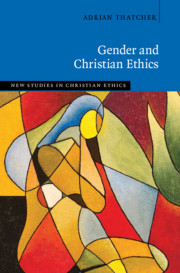Book contents
- Gender and Christian Ethics
- New Studies in Christian Ethics
- Gender and Christian Ethics
- Copyright page
- Contents
- General Editor’s Preface
- Acknowledgements
- Part I Gender and Violence
- Part II Double Vision
- Part III The Human Continuum
- Chapter 7 The Continuum and the Doctrine of God
- Chapter 8 The Human Continuum:
- Chapter 9 The Masculine–Feminine Binary and the Theological Critique of Culture
- Chapter 10 The Continuum and Sacred Texts
- Bibliography
- Index
- Titles Published in the Series (continued from page iii)
Chapter 9 - The Masculine–Feminine Binary and the Theological Critique of Culture
from Part III - The Human Continuum
Published online by Cambridge University Press: 15 October 2020
- Gender and Christian Ethics
- New Studies in Christian Ethics
- Gender and Christian Ethics
- Copyright page
- Contents
- General Editor’s Preface
- Acknowledgements
- Part I Gender and Violence
- Part II Double Vision
- Part III The Human Continuum
- Chapter 7 The Continuum and the Doctrine of God
- Chapter 8 The Human Continuum:
- Chapter 9 The Masculine–Feminine Binary and the Theological Critique of Culture
- Chapter 10 The Continuum and Sacred Texts
- Bibliography
- Index
- Titles Published in the Series (continued from page iii)
Summary
This chapter addresses the third binary of our inquiry, that between masculine and feminine. Remaining with the third aim of the book, ‘to demonstrate how the human continuum enables a more inclusive theological understanding … of relations between women and men’, our probe of masculinity begins with two attempts to outline a practical spirituality based on male gendered characteristics. The first of these is Matthew Fox’s The Hidden Spirituality of Men. The work opens with a comprehensive list of ills afflicting men in the ‘dualistic patriarchy’ of ‘Western culture’ (Fox 2008: xii). They are not in tune with their feelings; they work too hard; are often homophobic; and often believe in a male God who behaves in toxic – that is, in masculine – ways. The ‘spiritual life’ of men is ‘in trouble’ (2008: xiii) and their spirituality has become hidden (if not extinguished altogether). But Fox knows the cure. There is a ‘Divine Feminine’ and a ‘Sacred Masculine’. Note the nominal form of the adjectives ‘feminine’ and ‘masculine’, reifying them. At times, the terms convey little more than one of the themes of this book, that God transcends all gendered characteristics. If we ‘cannot receive a balanced sense of the gender of God (any statement on God is always a metaphor), then it follows that we are not living with a balanced gender sense of ourselves’ (Fox 2008: xix, author’s emphasis). But at other times, the divine Feminine is variously identified; with the rise of feminism, or the appearance of the Goddess Gaia, and so on. She has made ‘a grand comeback’ (Fox 2008: xviii), whereas the ‘Sacred Masculine’ is much less evident and can only be evinced by looking within.
- Type
- Chapter
- Information
- Gender and Christian Ethics , pp. 166 - 184Publisher: Cambridge University PressPrint publication year: 2020



